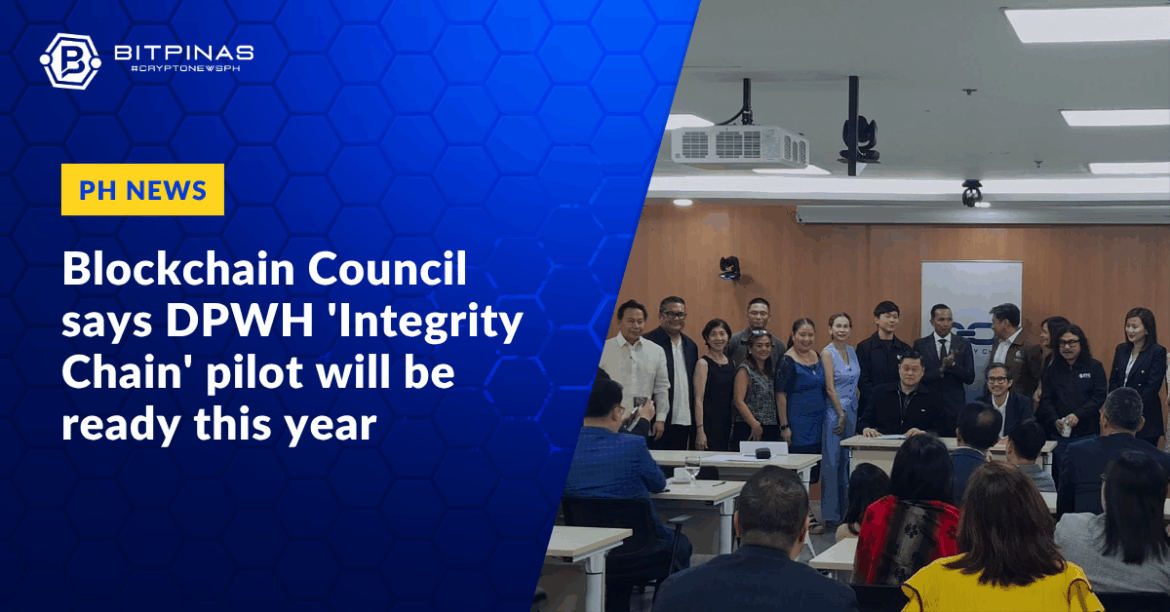Disclaimer: This article is for informational purposes only and does not constitute financial advice. BitPinas has no commercial relationship with any mentioned entity unless otherwise stated.
📬 Get the biggest crypto stories in the Philippines and Southeast Asia every week — subscribe to the BitPinas Newsletter.
The Blockchain Council of the Philippines (BCP) is ready to pilot its “Integrity Chain” platform this year, its president said, in a private-sector-led move to place the Department of Public Works and Highways’ (DPWH) national budget on an immutable ledger.
Integrity Chain by this Year
The initiative, which aims to boost transparency in public infrastructure spending, was detailed by BCP President Donald Patrick Lim at the Kapihan sa Manila Bay breakfast forum, according to a report from The Philippine Star.
Lim emphasized that the pilot project will be conducted at no cost to the government.
“It’s privately funded. The private sector is the one funding it. The council is the one working with all the stakeholders to execute it.”
Donald Lim, Lead Convenor, Integrity Chain
The project, which formally launched on Sept. 30, 2025, in partnership with the DPWH, has ignited a sharp debate, with proponents hailing it as a revolutionary anti-corruption tool while critics dismiss it as a costly, ineffective “buzzword.”
A ‘Human Blockchain’ For Transparency?
The Integrity Chain is a blockchain-based platform developed as a civic initiative, powered by BayaniChain Ventures. Proponents say it will make public spending tamper-proof and open to civic oversight.
- According to the previous press conference, the system will record project budgets, milestones, and compliance reports on a decentralized ledger. The first phase will focus on Foreign-Assisted Projects (FAPs) vetted by international agencies like JICA, ADB, and the World Bank.
- Lim said the initiative will use not only a technical blockchain but also a “human blockchain.” This refers to a network of 57 validators from trade groups, NGOs, academia, and media who will review and approve data before it is recorded.
Read related article:
Lim noted that the initiative goes beyond just advocating for reform, emphasizing that it aims to build the system that enables it:
“For the first time, the private sector isn’t just demanding integrity, we’re delivering it.”
Prominent Community and Thought Leaders Voice Significant Criticism
Critics Question Core Premise
As government agencies and lawmakers advocate for wider blockchain adoption, prominent community and thought leaders have voiced significant skepticism, questioning the technology’s effectiveness.
Former Solicitor General Florin Hilbay criticized proposals to place the national budget on a blockchain, arguing it would add cost and complexity without guaranteeing transparency.
- Hilbay said blockchain is often used as a “marketing buzzword” and warned the proposed system would likely operate as a centralized database, not a true decentralized ledger.
- Former DICT undersecretary Jeffrey Ian Dy cautioned that blockchain alone cannot eliminate corruption. He noted that while it can secure data, it cannot prevent collusion or manipulation in procurement processes that happen before data is entered.
- In another op-ed, John Clark Naldoza argued that government blockchain initiatives overlook the core issue of data accuracy, emphasizing that a blockchain “can only store, not verify, information.”
Calls for Civic Participation
Amid the debate, some community leaders are calling for constructive engagement over cynicism.
- Entrepreneur and angel investor Joe Josue urged the web3 community to prioritize accountability, stressing that “progress requires optimism and civic participation rather than distrust.”
- Josue expressed opposition to a state-owned blockchain, favoring private-sector-led initiatives to ensure transparency and effective implementation.
Are there Better Alternatives?
The discourse has also pushed alternative technologies to the forefront, which some experts argue are more practical.
- Technologist Dominic Ligot urged the government to focus on using AI instead of blockchain, emphasizing that AI can “process and make public documents searchable,” offering a more immediate solution.
- James Florentino supported this view, arguing that open data and AI are better suited for accountability. He said blockchain “only works when users are incentivized to participate, not when imposed by government mandates.”
- As another alternative, civic tech group BetterGov.ph recently launched OpenGovChain, a free and open-source platform demonstrating how public data like the national budget can be stored transparently on-chain.
- Its founder, Jason Torres, said the project aims to make blockchain concepts easier to understand while highlighting that “the technology alone cannot ensure integrity without proper checks and balances.”
Read more: BitPinas coverage on current initiatives and proposals exploring the use of blockchain in government processes.
This article is published on BitPinas: Blockchain Council Says DPWH ‘Integrity Chain’ Pilot Ready This Year

